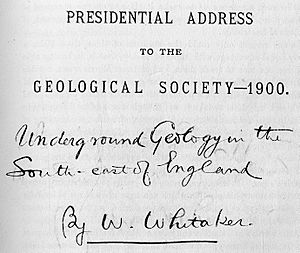William Whitaker (geologist) facts for kids
Quick facts for kids
William Whitaker
|
|
|---|---|
 |
|
| Born | 4 May 1836 London
|
| Died | 15 January 1925 Croydon
|
| Nationality | British |
| Alma mater | University College, London |
| Known for | Hydrogeology |
| Spouse(s) | Mary Whitaker (Nee Keogh) |
| Awards | Murchison Medal (1886) Prestwich Medal (1906) Wollaston Medal (1923) |
| Scientific career | |
| Fields | Geologist |
William Whitaker (born May 4, 1836, in London – died January 15, 1925, in Croydon) was an important British geologist. He spent his life studying the Earth, especially focusing on water and how it moves through rocks. His work helped us understand more about underground water supplies.
Early Life and Education
William Whitaker went to St Albans School when he was young. Later, he studied at University College, London. In 1855, he earned a degree in chemistry. This education gave him a strong scientific base for his future work.
A Career in Geology
After finishing his studies, William Whitaker became a geologist. He focused on finding and mapping water sources. This field is called hydrogeology, which is the study of how water moves through the ground.
His research was very detailed and thorough. He knew a lot about different types of rocks and how they hold water. He also wrote many books and papers. One of his most famous works was The Geology of London and of Part of the Thames Valley, published in 1889. Because of his important contributions, some people called him the "father of English hydrogeology."
Whitaker retired from his main job in 1896. However, he continued to work as a water engineer. This meant he kept helping with projects related to water supply and management.
He also helped scientists understand how some landforms are created. For example, he showed that long ridges of hills, called escarpments, are formed by wind, rain, and frost wearing away softer rocks over time. This was a big discovery in geology.
Awards and Recognition
William Whitaker received many honors for his work. In 1859, he became a fellow of the Geological Society, a group for geologists. Later, in 1883, he was elected a Fellow of the Royal Society. This is a very high honor for scientists in the United Kingdom.
He also led several important scientific groups. He was president of the Geologists' Association and the Geological Society. These roles showed how much other scientists respected his knowledge and leadership.
He received several prestigious awards:
- The Murchison Medal in 1886.
- The Prestwich Medal in 1906.
- The Wollaston Medal in 1923. This is the highest award given by the Geological Society of London.
William Whitaker passed away in Croydon, Surrey, in 1925. His work continues to be important for understanding Earth's water systems.

